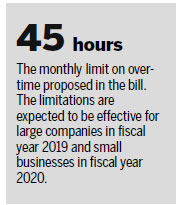Japan closer to controversial labor reforms
The Lower House of Japan's parliament on Thursday approved the labor reform bill, defined by Prime Minister Shinzo Abe as top of the agenda for the current session. The bill will be sent to the Upper House for deliberation and approval.
The bill, which is aimed at addressing karoshi, or death by overwork, will set the limits on overtime on 45 hours a month or 360 hours a year, or 720 hours in a busy year.
The limitations are expected to be effective for large companies in fiscal year 2019 and small businesses in fiscal year 2020. Lawbreaking businesses will be fined.
Japanese government came under pressure to change the country's work style following the suicide of a 24-year-old female employee of advertising giant Dentsu Inc in 2015. She worked about 105 hours of overtime in a single month starting on Oct 9, 2015.
Under the bill, regular and non-regular workers will enjoy the same pay for same work.

But the bill allows a controversial system that will set no limitations on overtime work for skilled professional workers who garner an annual earning of at least 10.75 million yen ($98,000) and exempt employers from paying overtime wages to such workers.
The Constitutional Democratic Party of Japan and the Japanese Trade Union Confederation oppose the exemption system for high-income specialists.
CDP lawmaker Kaichi Hasegawa said such a system could lead to long work hours for employees subject to the system and an increase in the number of deaths from overwork.
Japan's economy was in the past driven by so-called workaholic employees, but problems such as "death by overwork" have come to the forefront.
The ruling coalition of the Liberal Democratic Party and Komeito are considering extending the parliament's ongoing session, scheduled to end on June 20.
Human rights abuse
It is not clear whether the bill will apply to the foreigners working in Japan under the government-run Technical Intern Training Program, which is supposed to provide them training, technical skills and technology experience from workers from developing countries. The time limit under the program is five years.
The program has been criticized for rampant human rights abuse, such as long working hours, low safety standards and unpaid wages.
To offset the labor shortage in agriculture, construction and other sectors, the Abe administration decided on Tuesday to welcome more than 500,000 foreign workers through fiscal year 2025.
They will be required to pass a test demonstrating proficiency in the relevant field and the Japanese language. Those who go through the Technical Intern Training Program can stay for a total of 10 years.
A record 1.28 million foreigners worked in Japan in 2017, more than double the 480,000 in 2008. Nearly 29 percent of them were from China, followed by 19 percent from Vietnam, 12 percent from the Philippines, 9 percent from Brazil and 5 percent from Nepal.
Japan is suffering from a severe labor shortage as the postwar baby boomers leave the workforce, in what businesses called the worst conditions since the early 1990s in a Bank of Japan survey conducted in March.
caihong@chinadaily.com.cn
(China Daily 06/01/2018 page11)














